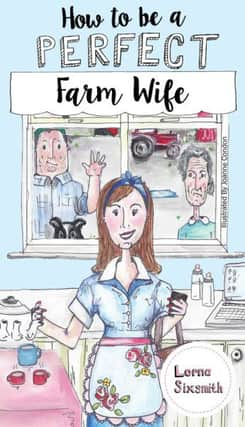How to be a perfect farm wife


Instead, Lorna Sixsmith starts from the premise that most modern Irish farm women are good-humoured, energetic, clever and adaptable, intent on seizing opportunities presented by travel, mass communications and new technology, including farm technology.
The aspects of farm life she discusses range from major family issues such as marriage, child rearing and financial management of the farm, to details such as how to make a perfect cup of tea (there are 32 pages of recipes in the book). or how to catch a calf. The level of detail can be minute, but is always useful. For example, when preparing cattle for milking in a parlour, she recommends that each cow should be allowed to find her own designated space.
Advertisement
Advertisement
Advice on how to attach the milking pumps to udders may well be based on hard experience!
“When putting the clusters on the udder, let your hands find the teats rather than sticking your head in close to the udder. You risk being kicked in the face if you do that” (p 109).
The book also moves beyond family life, to deal with community issues, including, for blow-ins, advice on how to fit in socially.
“As with all community events and committees, a tough skin is recommended before you join. Don’t bother to get into ‘competitions’ over the most impressive floral arrangements for church or the most popular tray-bakes at the village fair. If you try, someone is bound to attempt to put you in your place.” (p 201). At their best, Irish country people delight in the small absurdities of social life, and Lorna Sixsmith excels in this. Her take on sectarianism, for instance, is to marvel at Protestant skills in producing ‘tray bakes,’ while their Catholic friends make do with tins of USA biscuits. (p 168).
Advertisement
Advertisement
The advice given throughout the book emphasises the importance of attitude. For example, living ten miles from the nearest town and two miles up a grass-tracked boreen can be seen either as providing blissful solitude, or mind-numbing boredom. If the latter is the case, the advice given is typically bracing. “When you find yourself preventing cold-calling sales people from leaving, you know the isolation might be getting to you and it’s time to join a community group.”(p 16)
If Lorna Sixsmith was your neighbour, there would be no talk of anomie, loneliness and community decay - well, there might be, but only as a preface to a discussion of what we are going to do about it.
The book will have a valued place among other social commentaries that deal with the contingencies of Irish farming life: social histories, anthropological research and novels which, at their best, communicate everyday experiences, and go on to connect these to major social and historical movements. At a more popular level, this book will also fulfil the role of an old friend, waiting quietly until she is needed for advice and reassurance, or is simply sought out for the pleasure of her company.
JONATHAN BELL, BELFAST
Jonathan Bell was Head Curator in the Ulster Folk and Transport Museum where he worked for over 30 years. He is co-author with Mervyn Watson of Irish Farming Life, A History of Irish Farming 1750-1950 and Rooted in the Soil: A history of cottage gardens and allotments in Ireland since 1750.